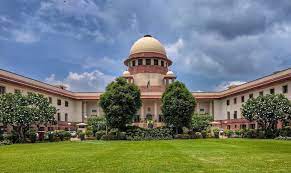The arbitral proceedings culminated in an award (Para 2)
These proceedings under Section 34 of the Arbitration Act culminated in the award being upheld by the A.D.J. (Special Commercial Court, Gurugram), albeit with some modifications, on 25.04.2019. An appeal filed against the same under Section 37 of the Arbitration Act is stated to be pending. (Para 2)
Meanwhile, the Corporate Insolvency Resolution Process (‘CIRP’) was initiated against the Corporate Debtor (Para 3)
Thereafter, the IRP was replaced and respondent no. 1 was appointed as Resolution Professional (RP) (Para 4)
We may note that the Corporate Debtor is not a party before us. However, the Resolution Professional has been arrayed as respondent no.1, while respondent no.2 is the successful resolution applicant. Respondent no.2 was impleaded in the present civil appeal by this Court’s order dated 29.10.2021. (Para 4)
The appellant sent an email on 19.08.2020 to respondent no.1 highlighting their pending claim of Rs.35,67,05,337 against the Corporate Debtor arising from the arbitral award dated 01.08.2016, confirmed with certain modifications in the proceedings under Section 34 of the said Act. However, respondent no.1 rejected this claim on 25.08.2020 on the ground that the time period for submitting the claim was within 90 days of initiation of CIRP and the applicant was 287 days late. A Resolution plan had already been passed by the COC. (Para 5)
This relief was granted to the appellant by the Adjudicating Authority vide an order dated 03.11.2020 predicated on the following grounds: (a) respondent no.1 could not have summarily rejected appellant’s claim, as this claim would have appeared in the Corporate Debtor’s books of accounts; (b) in case such books of accounts were not available, respondent No. 1 had a duty to obtain them and verify the financial position; and (c) as such announcement was made through public newspapers, it was likely that the appellant missed out on the same. (Para 6)
The appellant having made the claim more than a year after the invitation of claims by the public notice dated 30.03.2019; it was urged that allowing such claims would set the clock back on the CIRP and set a precedent, thereby making CIRP prolonged and inefficacious. (Para 8)
On the other hand, the appellant explained that it could not file the claim in time as it was unaware of the public announcement. A belated claim should not be shut out as the time-periods in the IBC are merely directory and not mandatory (Para 8)
The IBC is a time bound process. There are, of course, certain circumstances in which the time can be increased. The question is whether the present case would fall within those parameters. The delay on the part of the appellant is of 287 days. The appellant is a commercial entity. That they were litigating against the Corporate Debtor is an undoubted fact. We believe that the appellant ought to have been vigilant enough in the aforesaid circumstances to find out whether the Corporate Debtor was undergoing CIRP. The appellant has been deficient on this aspect. The result, of course, is that the appellant to an extent has been left high and dry. (Para 19)
Section 15 of the IBC and Regulation 6 of the IBBI Regulations mandate a public announcement of the CIRP through newspapers. This would constitute deemed knowledge on the appellant. In any case, their plea of not being aware of newspaper pronouncements is not one which should be available to a commercial party. (Para 20)
The mere fact that the Adjudicating Authority has yet not approved the plan does not imply that the plan can go back and forth, thereby making the CIRP an endless process. (Para 21)
We have thus come to the conclusion that the NCLAT’s impugned judgment cannot be faulted to reopen the chapter at the behest of the appellant. (Para 22)
SUPREME COURT OF INDIA
2023 STPL(Web) 259 SC
[2023 INSC 816]
M/S. Rps Infrastructure Ltd. Vs. Mukul Kumar & Anr.
Civil appeal no. 5590 of 2021-Decided on 11-9-2023
https://stpllaw.in/wp-content/uploads/2023/09/2023-STPLWeb-259-SC.pdf







